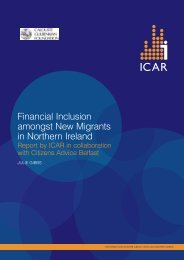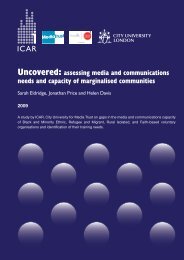The Somali community in the UK: What we know and how we ... - ICAR
The Somali community in the UK: What we know and how we ... - ICAR
The Somali community in the UK: What we know and how we ... - ICAR
You also want an ePaper? Increase the reach of your titles
YUMPU automatically turns print PDFs into web optimized ePapers that Google loves.
Health<br />
Despite <strong>the</strong> importance of <strong>the</strong> issue, <strong>the</strong>re are as<br />
yet comparatively few recent studies that focus<br />
exclusively on <strong>the</strong> topic of health, 107 which also<br />
receives somewhat cursory treatment <strong>in</strong> regional<br />
studies of <strong>the</strong> <strong>Somali</strong> <strong>community</strong>. 108 When <strong>the</strong><br />
health group reported to a session of <strong>the</strong> <strong>Somali</strong><br />
Community Meet<strong>in</strong>g hosted by Jeremy Corbyn<br />
MP at <strong>the</strong> House of Commons (29.03.03) <strong>the</strong><br />
document mentioned <strong>the</strong> high rate of <strong>in</strong>fectious<br />
diseases - hepatitis, tuberculosis - <strong>and</strong> <strong>the</strong><br />
prevalence of chronic conditions such as cancer,<br />
hypertension, <strong>and</strong> diabetes. It also expressed<br />
concern over <strong>the</strong> growth of HIV/AIDS. <strong>The</strong>re<br />
is little here which is <strong>Somali</strong>-specific. Various<br />
conditions associated with a <strong>we</strong>stern lifestyle,<br />
such as <strong>the</strong> grow<strong>in</strong>g <strong>in</strong>cidence of obesity, are not<br />
yet mentioned <strong>in</strong> research as a problem. On <strong>the</strong><br />
contrary, accord<strong>in</strong>g to a <strong>Somali</strong> health advisor<br />
at Oxford House, a To<strong>we</strong>r Hamlets <strong>community</strong><br />
centre, <strong>the</strong> danger is more one of malnutrition,<br />
exacerbated by poverty <strong>and</strong> <strong>the</strong> practice of send<strong>in</strong>g<br />
money back to families at home (Green, 2001:<br />
B3). But o<strong>the</strong>r conditions, asthma for example,<br />
are mak<strong>in</strong>g <strong>the</strong>ir appearance, <strong>and</strong> <strong>the</strong> basic profile<br />
of physical health is shared by many deprived<br />
communities, both <strong>in</strong>digenous <strong>and</strong> refugee.<br />
<strong>The</strong> contribut<strong>in</strong>g causes of ill health are <strong>we</strong>llrehearsed.<br />
Poor hous<strong>in</strong>g is one. Local authorities<br />
have an obligation to house those with refugee<br />
status <strong>and</strong> leave to rema<strong>in</strong>, but <strong>the</strong> social hous<strong>in</strong>g<br />
stock is dw<strong>in</strong>dl<strong>in</strong>g, <strong>and</strong> refugees often f<strong>in</strong>d<br />
<strong>the</strong>mselves <strong>in</strong> <strong>the</strong> oldest accommodation, plagued<br />
by damp <strong>and</strong> verm<strong>in</strong>. 109 Asylum seekers without<br />
leave to rema<strong>in</strong> will be housed <strong>in</strong> temporary<br />
accommodation which <strong>in</strong>cludes hostels, bed <strong>and</strong><br />
breakfasts <strong>and</strong> short-life property. <strong>The</strong>re are also<br />
problems associated with more recent hous<strong>in</strong>g<br />
- when lifts <strong>in</strong> to<strong>we</strong>r blocks break, families with<br />
young children are conf<strong>in</strong>ed <strong>in</strong>doors. <strong>Somali</strong>s<br />
also suffer a particular problem of overcrowd<strong>in</strong>g.<br />
Through restrictions on birth control <strong>and</strong> a cultural<br />
emphasis on <strong>the</strong> procreative capacity of women,<br />
<strong>Somali</strong> Muslim families tend to be large - to have<br />
six or seven children is not unusual. In addition,<br />
new arrivals often have difficulty f<strong>in</strong>d<strong>in</strong>g somewhere<br />
to live, <strong>and</strong> take advantage of norms of family or<br />
clan obligation to move <strong>in</strong> with relatives. British<br />
hous<strong>in</strong>g is not designed for large households, <strong>and</strong><br />
<strong>the</strong> health of members <strong>in</strong>evitably suffers.<br />
Access to health care is ano<strong>the</strong>r problem, common<br />
to many groups of refugees. In his study of <strong>the</strong><br />
needs of <strong>Somali</strong> <strong>and</strong> Eritrean women refugees<br />
<strong>in</strong> Har<strong>in</strong>gey, Bernard-Jones (1992) found that<br />
this was a particular site of stress. In <strong>the</strong>ory, all<br />
asylum seekers <strong>and</strong> refugees are entitled to <strong>the</strong><br />
same NHS care as <strong>the</strong> <strong>in</strong>digenous population, but<br />
what is required is a basic underst<strong>and</strong><strong>in</strong>g of <strong>the</strong><br />
system which <strong>Somali</strong>s often lack. <strong>The</strong>y also need<br />
ready contact with a GP, <strong>and</strong> good communication<br />
with health professionals. But many face an <strong>in</strong>itial<br />
problem of register<strong>in</strong>g with a doctor - <strong>in</strong> areas<br />
with a mobile population <strong>and</strong> a high proportion of<br />
refugees, doctors may be reluctant to open <strong>the</strong>ir<br />
lists. This is both because of perceived pressure<br />
of numbers (Green, 2001: 24) <strong>and</strong> also because of<br />
communication - arrang<strong>in</strong>g translators presents<br />
a severe f<strong>in</strong>ancial <strong>and</strong> logistical problem to <strong>the</strong><br />
present NHS. In April 2002 a Dr McAvoy, with a<br />
dedicated Sheffield practice, expla<strong>in</strong>ed his reasons<br />
for clos<strong>in</strong>g his doors. His 6,100 patients speak<br />
37 languages bet<strong>we</strong>en <strong>the</strong>m – <strong>in</strong>clud<strong>in</strong>g <strong>Somali</strong><br />
– <strong>and</strong> a third have little English. Translators are<br />
sometimes available <strong>in</strong> person or by phone, but <strong>the</strong><br />
consultation will <strong>the</strong>n take from twice to ten times<br />
as long. 110 For <strong>the</strong> patient, lack of good translation<br />
can sabotage <strong>the</strong>ir health care. In Harper-Bulman’s<br />
study of <strong>Somali</strong>s <strong>and</strong> <strong>we</strong>st London maternity<br />
services (1997), language <strong>and</strong> communication<br />
107. Exceptions <strong>in</strong>clude Marianne Green’s report on <strong>Somali</strong> health needs<br />
<strong>in</strong> To<strong>we</strong>r Hamlets (2001), <strong>and</strong> Kate Harper-Bulman’s <strong>the</strong>sis on <strong>Somali</strong><br />
women’s experiences of West London maternity services (1997). See also<br />
Mohamed (1993), Musa <strong>and</strong> Marks (1996) <strong>and</strong> Mullock <strong>and</strong> Duale<br />
(1999).<br />
108. E.g. <strong>the</strong> brief overview of <strong>the</strong> problems <strong>in</strong> access<strong>in</strong>g health provision<br />
for <strong>Somali</strong>s <strong>in</strong> Leicester <strong>in</strong> Daahir <strong>and</strong> Duale, 2002: 33-35.<br />
109. For <strong>Somali</strong> hous<strong>in</strong>g conditions <strong>in</strong> Liverpool see <strong>the</strong> survey by <strong>the</strong><br />
Granby Toxteth Community Project, 1993: 41-49. Holman <strong>and</strong> Holman<br />
(2003) have researched hous<strong>in</strong>g conditions <strong>in</strong> <strong>the</strong> London Borough of<br />
Hackney, whilst Cole <strong>and</strong> Rob<strong>in</strong>son’s recent report (2003) is <strong>the</strong> most<br />
thorough <strong>in</strong>vestigation of <strong>Somali</strong> hous<strong>in</strong>g experience to date.<br />
110. Dr<strong>in</strong>kwater, James, <strong>The</strong> Guardian 25.04.02<br />
<strong>The</strong> <strong>Somali</strong> <strong>community</strong> <strong>in</strong> <strong>the</strong> <strong>UK</strong><br />
53

















